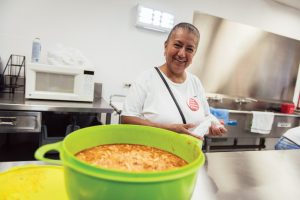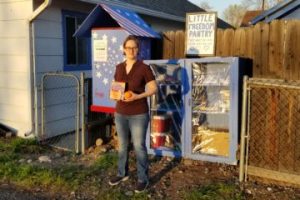Increase access to food and create jobs
Cities should revisit existing rules around food production to provide greater flexibility and remove red tape so that food entrepreneurs can do what they do best: feed their communities.
The COVID-19 pandemic has left many struggling to provide for their families and it has highlighted the need for access to locally grown, produced, and prepared food. Between stay-at-home orders, job losses, and supply chain disruptions, many people found themselves without access to, or the means to pay for, basic food items. And early in the pandemic, those who were financially and physically able to venture to grocery stores often found depleted shelves when they got there.
Local entrepreneurs have identified local solutions
Meanwhile, local food entrepreneurs have jumped in to help feed their communities. Restaurants started operating as small grocers, selling difficult-to-find home essentials like toilet paper and flour. Community members created “little free pantries” for people to donate non-perishable items for pick-up by families struggling to keep food on the table. Others are using the time at home to start cottage food businesses or home gardens where they grow fresh produce to feed their families and share with neighbors.
But in many cities, complicated, outdated, and duplicative regulations can make it difficult for entrepreneurial residents to feed their communities in commonsense ways during a crisis. To allow residents to feed their communities, cities should work with local licensing, health, and zoning departments to:
- Be Flexible: Allow entrepreneurs the leeway to adapt;
- Actively Reform: Remove or change requirements and processes that no longer serve a purpose;
- Ease Enforcement: Stop enforcing rules that are only getting in the way.
Five real-world steps your city can take to support local food entrepreneurs:

Streamline food business licensing and regulation.
Cities should support local businesses that contribute to food access and create jobs—like grocery stores, farmers’ markets, food trucks, and restaurants. Regulatory processes should be streamlined to ensure that people can start and expand these businesses where customers need them. Licensed food businesses should have the flexibility to meet their community’s needs, even if it means altering their business model. Cities should relax restrictions on where mobile vendors can sell and simplify the farmers’ market permitting process to allow local producers to reach customers closer to home. Allowing greater flexibility for using public spaces like plazas, parks, and sidewalks for dining allows businesses to stay open while serving customers safely.

Increase access to shared commercial kitchen space.
Shared kitchen spaces are licensed commercial kitchens that allow local food entrepreneurs to rent kitchen time as they need it. As some restaurants remain shuttered, shared kitchen spaces can allow local chefs to prepare to-go meals and catering safely and earn income for their families. City leaders should advocate for simple regulations that allow local chefs to start and use shared commercial kitchens and make it easy for existing restaurants and church kitchens to share their kitchen space when they aren’t using it.

Support home-based cottage food entrepreneurs.
Cottage food laws allow home-based food producers to sell certain goods from their homes. These operations are mostly governed by state laws, but entrepreneurs may be subject to local zoning regulations and permitting that can stop them from serving their customers. To support these businesses, cities can streamline the process for obtaining home occupation permits and review procedures for inspections with local health departments to ensure that these processes are simple and easy to navigate.

Support sustainable communities through home gardens and urban farms.
Home gardens and urban farms provide an easily accessible, inexpensive source of nutritious food. As many are stuck at home, cities should encourage citizens to go outside and enjoy safe and healthy activities like gardening. Cities should eliminate restrictions that prohibit edible vegetable gardens and rethink burdensome regulations that unreasonably restrict what property owners may grow. Likewise, cities should rethink outdated zoning ordinances that prohibit small-scale agriculture in urban or commercially zoned districts.

Fight hunger and support grassroots charity.
Restrictive regulations for food businesses and food charities can keep people from helping others in a crisis. Local governments should encourage these actions, especially at a time when many are finding creative ways to feed their neighbors. Cities should ease zoning and health requirements for those trying to provide free or low-cost food and services. Cities should reform zoning codes to allow community members to pursue new, innovative ways of serving their communities.
Let’s get to work in your city.
Please fill out this form and an IJ staff member will reach out to you shortly.
